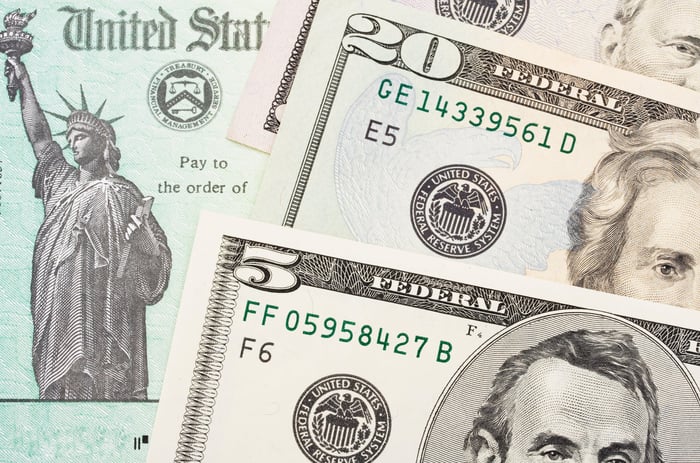Over the past two months, we've witnessed a truly historic response to the coronavirus global pandemic. Within the U.S., which is home to nearly a third of the world's almost 2.5 million confirmed cases of COVID-19, mitigation measures have included everything from suggested social distancing to mandated stay-at-home orders featuring the multiweek closure of nonessential businesses.
Such a coordinated response to save lives is unprecedented, as is the $2.2 trillion Coronavirus Aid, Relief, and Economic Security Act (the CARES Act, for short) passed by Congress and signed into law by President Trump on March 27. This record-breaking relief package is responsible for the stimulus checks that most Americans are abuzz about, as well as the many questions and the confusion regarding these payouts.
With that being said, here are the 16 things you absolutely must know about your stimulus check.

Image source: Getty Images.
1. $300 billion was set aside for stimulus payouts
Although the bulk of the funding for the CARES Act goes to support distressed industries, supply small-business loans, and expand unemployment benefits, $300 billion was set aside for Economic Impact Payments, as your stimulus payout is officially known.
2. The maximum you can receive is $1,200 per person or $2,400 for a couple
As a single filer, the maximum stimulus payout is $1,200, with married couples filing jointly able to net a payout for as much as $2,400. Your payout eligibility is based on your adjusted gross income (AGI), with single filers under $75,000 in AGI, head-of-household filers below $112,500 in AGI, and married couples filing jointly with less than $150,000 in AGI netting the full payout.
3. Have children? You may net an additional $500 per child
Households with qualifying children can net an even larger payout. Children age 16 or under can boost stimulus checks by $500 per child. This means a married couple with two children can receive a payout of $3,400.

Image source: Getty Images.
4. Social Security beneficiaries are eligible for a stimulus check
Though there had been some initial concern that Social Security beneficiaries could be excluded from the stimulus package if they hadn't filed a recent tax return, this worry turned out to be unwarranted. With a few exceptions, which I'll get to in a moment, senior citizens are able to receive an Economic Impact Payment, even if they haven't filed a tax return. That's because the Internal Revenue Service (IRS) can access Social Security beneficiaries' payout records and send stimulus checks to the same account that benefits are currently deposited into.
5. Your eligibility is based on your most recent tax filing
Your eligibility for a stimulus check is determined by your AGI in your most recent tax filing. If you haven't filed your tax return for the 2019 calendar year (Tax Day has been pushed back to July 15 due to coronavirus-related disruption), the IRS will use your AGI from your 2018 filing to determine your eligibility.
6. Not everyone qualifies for a payout
As noted in point four, not everyone qualifies for a stimulus check. High-income earners, dependents age 17 and older (yes, this includes dependent seniors), and noncitizens without a legal pathway to citizenship are ineligible for a payout. A high-income earner is defined as a single, married, or head-of-household tax filer with more than $99,000, $198,000, or $136,500, respectively, in AGI.
You'll note that there's an AGI middle ground between where payouts are maximized and where they cease completely. In this phase-out area ($75,000 to $99,000 for single filers, $150,000 to $198,000 for married filing jointly, and $112,500 to $136,500 for heads of household), the payout is reduced by $5 for every $100 in AGI.

Image source: Getty Images.
7. You can still receive a payout if you owe back taxes or have defaulted on a student loan
Interestingly, you don't have to sweat if you're late on your student loan payments, or even if you owe back taxes to the federal government. The CARES Act contains language that specifically disallows federal and state debt collectors from seizing Economic Impact Payments. The only exception is if you're in arrears on child support payments. Then it's quite possible your payout could be seized to offset some or all of what you owe.
8. Debt collectors may be able to lay claim to your stimulus payout
Things get a bit murkier when it comes to private debt-collection agencies. Private debt collectors aren't bound by the same rules as those for federal and state debt collectors, so it's quite possible they could go after stimulus funds in your bank account. Some states have laws in place to forbid such actions, but you'll need to check your applicable state law concerning debt collection.
9. If you owe your bank money, it may be able to gobble up your stimulus check
In addition to debt collection agencies going after your Economic Impact Payment, your bank could do the same if it's owed money, such as in the case of a checking account overdraft or a loan default. Thus far, JPMorgan Chase and Wells Fargo have pledged to not use stimulus checks to offset customer debts. But it remains a possibility at other banks, big and small.

Image source: Getty Images.
10. Direct-deposit payouts will go out first
The first payments to go out are to those taxpayers who have their bank account information on file with the IRS. You'll note that in order to receive a direct-deposit stimulus payment, you'll need to have received a refund from the IRS in a recent tax filing. The IRS isn't able to access your bank account information in instances where, say, the agency has withdrawn funds from your account to satisfy a tax bill.
11. Paper checks will be issued in AGI increments of $10,000, beginning with low-income Americans
If you're among the tens of millions of Americans in line to receive a paper check, understand that they'll be paid out based on your AGI, in increments of $10,000, and with the lowest-income Americans getting their payouts first. Given these $10,000 weekly increments, it'll take a full 20 weeks to send out physical stimulus checks to married couples filing jointly who made between $190,000 and $198,000 in AGI in either 2018 or 2019.
12. Your payout may be delayed for a variety of reasons
Wondering where your stimulus check is? Don't worry, you're not alone. There are about a half-dozen reasons your check could be delayed, including that you haven't received a direct-deposit tax refund in years, have an old bank account on file with the IRS, or filed a paper tax return. Heck, it's even possible that President Trump's desire to have his name appear on these stimulus checks will delay the initial rollout of paper checks this week.

Image source: Getty Images.
13. You can check the status of your Economic Impact Payment online
For those of you waiting on the edge of your seat for your payout, there's an online tool from the IRS that'll help you check on its status.
14. Some people will have to do extra legwork to receive a stimulus check
Some folks (mostly low-income Americans) may have to take some extra steps in order to receive stimulus money. For instance, single filers or married couples who haven't had to file a tax return in years due to their income being well below the standard deduction amount will need to enter their basic information online with the IRS in order to be eligible for a payout.
15. You won't owe any tax on your stimulus payout
The Economic Impact Payment is essentially set up as a tax credit to the American public, which means it won't count toward an individual's or couple's AGI for the 2020 tax year. In other words, you should get to keep every cent you receive.
16. Stimulus-check scams are everywhere, so protect yourself
Lastly, understand that an abundance of $1,200 and $2,400 direct deposits and paper checks means scammers are coming out of woodwork to trick you into giving them your money. Understand that the IRS isn't going to call or email you to ask for your personal information, and be mindful of emailed links that look suspicious and claim to pertain to your stimulus payout.






